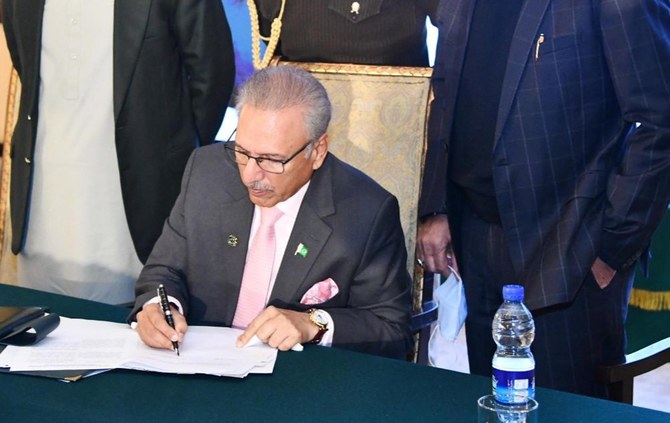ISLAMABAD: Pakistani President Arif Alvi on Thursday signed the Election (Amendment) Bill, 2021 that allows the use of electronic voting machines (EVMs) in the country, Pakistani state-run APP news agency reported.
Last month, a joint parliamentary sitting sanctioned the use of EVMs for the next general elections, though opposition factions resisted the move and vowed to challenge it in the country’s top court.
The government has lately pushed for the use of technology to make future Pakistani elections fairer and more transparent, but opposition parties accuse it of trying to manipulate the voting system by introducing technology, which has not been tested in Pakistan before.
Alvi, however, asked critics not to be afraid of a “simple” electronic voting machine (EVM), which he said would help hold a fair election and bring an end to poll rigging.
“People will have to trust it. It involves no advancement. It is too simple. The country achieves progress by adopting new things,” the president said, addressing a ceremony wherein he signed the bill into law.
The bill also provides for the right of vote to overseas Pakistanis.
EVMs will ensure holding a fair election that has long been desired in Pakistan as every election followed controversies and rigging allegations, which also impacted credibility of respective governments, according to Alvi.
These machines would help print votes on the spot, instead of printing ballot papers at the press. They would help do away with the practice of printing extra ballot papers that used to be sold out later, kidnapping of presiding officers, and confusion in vote count.
He said the voter would cast their vote by touching the EVM screen, instead of stamping the ballot paper. “The process is the same. Then what is the resistance for?”
While the machine would use an in-built calculator to count votes, manual counting would also be available for skeptics, the president said, adding that the Ministry of Science and Technology was not a manufacturer of EVMs, it rather made a prototype for experiment.
It would be the Election Commission of Pakistan (ECP) to select the EVM based on the required specifications, he explained.
About Internet-voting (I-voting) for overseas Pakistanis, Alvi recounted the ruling Pakistan Tehreek-e-Insaf’s (PTI) legal and political struggle for voting right to Pakistani expatriates. He said physical voting for expatriates was not possible due to multiple complications.
The countries, which had rejected EVMs, had their own better systems in place, according to the president. Contrarily, Pakistan needed it owing to weaknesses in its system.
EVMs would help alleviate confusion caused by post-election rigging allegations and bring about a strong government to support democracy, he said.
“Don’t worry, the nation will be convinced,” the president remarked. “Just like this one, the country will make progress in other fields too.”

















